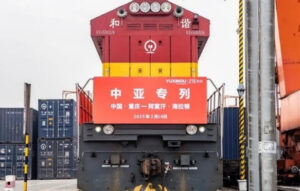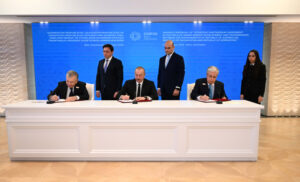
On July 4, the President of the Republic of Uzbekistan took part in the 17th summit of the Economic Cooperation Organization (ECO), which was held in Khankendi under the chairmanship of the President of Azerbaijan.
The summit was attended by heads of state and government of SCO member states, including Iran, Kyrgyzstan, Tajikistan, Turkey, Pakistan, Kazakhstan, Turkmenistan, as well as representatives of Afghanistan, international organizations, and business circles of the region.
The participants discussed prospects for deepening multilateral cooperation and exchanged views on key issues on the international and regional agenda.
At the beginning of his speech, President Shavkat Mirziyoyev outlined the current challenges to security and sustainable development, reaffirmed his commitment to the peaceful settlement of conflicts, and stressed the importance of a just settlement of the Palestinian-Israeli issue. Among the new initiatives put forward are:
• Adoption of the concept of “Strategic Goals of Economic Partnership – 2035,” which focuses on digitalization, innovation, and artificial intelligence.
• Holding a meeting of trade ministers on ECO issues in Tashkent to discuss strategic issues and prepare an agreement on trade facilitation.
• Creation of a system of “green corridors” for the rapid exchange of information and unhindered trade in agricultural products.
• Development of a long-term Ecoinvest program to stimulate private and international investment in sustainable projects in the region.
• Forming alternative transport corridors, in particular, developing the China-Kyrgyzstan-Uzbekistan railway with further connection to the Trans-Afghan Corridor.
• Accelerating the creation of a Digital Transport and Customs Office to coordinate the digitalization of logistics.
• Holding an ECO national airline forum in Samarkand to stimulate air transport, tourism, and marketing cooperation in the aviation sector.
• Developing a roadmap for expanding tourism services aimed at doubling tourist flows within the ECO.
• Creation of a cross-border “green program” for the restoration of ecosystems in desert areas with an emphasis on afforestation and the development of recreation.
• Preparation of proposals for reforming the EAEU to enhance its effectiveness and authority in the international arena.
In conclusion, the President of Uzbekistan expressed his confidence that the summit would give new impetus to economic cooperation and open a stage of meaningful transformation of regional partnership.
Full text of the speech by the President of Uzbekistan

Ukrainian tour operator Join UP! plans to launch franchising in the Baltic States and Kazakhstan in 2024, according to Marina Dayneko, head of the Join UP! sales office, in an interview with the Interfax-Ukraine news agency.
“Currently, more than 100 agencies are operating under this model in Ukraine, and four in Moldova, two of which opened this year. We are continuing to develop franchising in Poland and are currently signing agreements with both Polish and Ukrainian partners. This year, we are launching franchising in Kazakhstan and the Baltic states,” she said.
As reported, the travel company Join UP! LLC was established in 2013 with a registered capital of UAH 72.671 million. The ultimate beneficiaries are Yuriy and Oleksandr Alby. According to the OpenDataBot service, at the end of 2024, the tour operator’s revenue decreased to UAH 376,000 from UAH 16,639,000 in 2023, and its net loss decreased to UAH 217,451,000 from UAH 233,341,000, respectively.
The brand’s international expansion covers eight markets: the Baltic states, Kazakhstan, Moldova, Poland, Romania, and the Czech Republic. Preparations are underway to launch operations in Slovakia and Hungary. Last year, the brand also opened its first franchise agency on the international market in Katowice, Poland.

As part of the expansion of transport corridors and the development of international transportation, the first container train from India to Kazakhstan via Uzbekistan was launched.
According to the press service of JSC “Uztemiryulcontainer”, the train, which includes 12 twenty-foot containers, departed from the port of Mundra (India) to the station of Sorokov (Kazakhstan). The route passes through Iran, Turkmenistan, Uzbekistan and Kazakhstan, covering 1,585 km by sea and 4,300 km by rail.
Previously, container shipments from India to Uzbekistan (Mundra – Sergeli) have been successfully carried out along this route.

On February 10 this year, the first freight train was sent from China to Afghanistan via a new direct rail route connecting the two countries through Kazakhstan and Uzbekistan. The train, carrying 55 containers of communication equipment manufactured by the Chinese telecommunications concern ZTE, departed from Chongqing’s Tuanjetsun station to Afghanistan’s Hairaton.
The train will cross the border at the Khorgos checkpoint in the Xinjiang Uygur Autonomous Region and reach its destination in Khairaton via Kazakhstan and Uzbekistan.
The entire journey is expected to take 12-15 days. “By using the direct rail freight transportation scheme, transportation time will be reduced by 3-5 days compared to road transportation, and logistics costs are expected to be reduced by 15-20%. This will strengthen the safety and efficiency of transportation and supply of goods,” said Liu Jianfeng, a ZTE employee.
The opening of the direct freight route will further strengthen trade and economic cooperation and exchanges between Chongqing and Afghanistan, as well as with other Central Asian countries.

On November 13, as part of the COP29 summit, a ceremony was held to sign the Agreement on Strategic Partnership in the Development and Transmission of Green Energy between Uzbekistan, Kazakhstan and Azerbaijan.
In his speech at the event, President of the Republic of Uzbekistan Shavkat Mirziyoyev emphasized that renewable energy is not an economic goal, but a contribution to the future, the result of a sense of responsibility to future generations.
The environmental importance of the project was particularly emphasized. The energy to be transmitted is wind and solar energy, a renewable and clean resource that will reduce the impact on the climate.
Thus, the parties support joint efforts to protect the climate under the Paris Agreement and the Sustainable Development Goals.
It was noted that the signatory countries, having significant renewable energy resources, can make a significant contribution to the global energy transition.
Touching upon the efforts of Uzbekistan to develop a green economy, the Leader of Uzbekistan focused on the key aspects of large-scale work in this direction.
It was noted that about two gigawatts of solar and wind generation capacity is being commissioned annually in the country. In addition, an additional 2.6 gigawatts of renewable generation and 300 megawatts of energy storage systems will be connected to the grid by the end of this year.
By 2030, it is planned to increase the share of renewable energy sources to 40 percent, as well as to create 4.2 gigawatts of energy storage systems.
It was expressed that the economic effect of this project will be felt by all its participants.
The importance of accelerating the project implementation, including the establishment of a joint venture, development and approval of technical documentation and other procedures, was emphasized.
In conclusion, President Mirziyoyev reaffirmed Uzbekistan’s commitment to the joint implementation of this regional project.